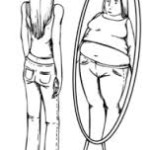 Teens who suffer from this disorder frequently glance at reflective surfaces, not just mirrors, in order to check out their appearance. They may avoid mirrors altogether or repeatedly measure or touch the perceived defect on their bodies. There may be skin picking or excessive grooming. They often go through elaborate grooming rituals an attempt to camouflage their appearance without hats, their hands or even make up. Teenagers who suffer from BDD may drop out of school, suffer from major depression and may even commit suicide.
Teens who suffer from this disorder frequently glance at reflective surfaces, not just mirrors, in order to check out their appearance. They may avoid mirrors altogether or repeatedly measure or touch the perceived defect on their bodies. There may be skin picking or excessive grooming. They often go through elaborate grooming rituals an attempt to camouflage their appearance without hats, their hands or even make up. Teenagers who suffer from BDD may drop out of school, suffer from major depression and may even commit suicide.
Some who have body dysmorphic disorder can also suffer from obsessive-compulsive disorder, social phobias or delusional disorders. Some estimates place the number of individuals who suffer from body dysmorphic disorder at one in every 50 people. There is often a gradual onset but it can happen abruptly. Most often individuals are perfectionists and may also suffer from low self-esteem.
Body parts which are most frequently obsessed over in body dysmorphic disorder are breast size, hair, skin, moles or freckles, muscle size and even genitalia. This feature can change over time and the disorder can become so pervasive that the individual becomes delusional, imagining that something is there that really isn’t.
Shame and embarrassment about their appearance usually keeps an individual from seeking treatment. Often times it is friends and family members who convince the individual that something is wrong and they must seek the help and treatment of their physician or mental health provider. Body dysmorphic disorder does not get better on its own and, when left untreated, will get worse possibly leading to suicidal thoughts and behavior.
Resources:
MayoClinic: Body Dysmorphic Disorder
http://www.mayoclinic.com/health/body-dysmorphic-disorder/DS00559
Anxiety and Depression Association of America: Body Dysmorphic Disorder
World Psychiatry: Body Dysmorphic Disorder
http://www.ncbi.nlm.nih.gov/pmc/articles/PMC1414653/
Kids Health: Body Dysmorphic Disorder
http://kidshealth.org/parent/emotions/feelings/bdd.html
| Advertisement | |
 |
|


Leave a Reply